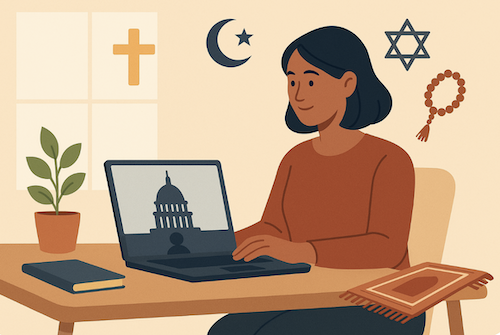Our information is written for federal employees and reviewed by attorneys highly-experienced in federal employment law. We follow strict internal standards to ensure everything we publish is reliable, transparent, and up to date.
- Expert: Justin Schnitzer, Esq. — Lead Attorney & Founder, represented 1,000+ federal cases across EEOC, MSPB, and OPM
- Expert: Gary Poretsky, Esq. — Attorney, Disabled Veterans’ Rights advocate, 17+ years
- Focus: Practical legal guidance for federal employees
- Last updated: August 2025
New guidance urges agencies to adopt a generous approach—allowing telework for observant federal employees unless denying it is justified by substantial operational impact.
Washington, D.C., July 28, 2025 — The U.S. Office of Personnel Management (OPM) has formally encouraged agencies to approve telework requests made on religious‑observance grounds. This guidance, released in a July 16 memo, instructs agencies to adopt a “generous approach” when reviewing religious accommodation requests, with telework now considered a preferred, cost‑effective option whenever feasible.
The memo explicitly ties this policy change to the Supreme Court’s unanimous decision in Groff v. DeJoy, handed down on June 29, 2023, which clarified that employers must demonstrate substantial increased costs before refusing a reasonable religious accommodation—overturning the prior “de minimis” threshold. OPM Director Scott Kupor emphasized that federal agencies must now comply with Title VII and apply the higher hardship standard when considering requests based on religion.
What happened here matters because it marks a clear affirmation of religious liberty within the federal workplace. Under the new guidance, observances such as Sabbath days, time‑specific prayers, meditation, fasting, or preparation for religious holidays can warrant telework unless denial is justified by a proven operational burden. OPM encourages agencies to assess feasibility on a case‑by‑case basis, taking into account job duties, technology, and existing telework eligibility.
This policy is especially notable given the broader return‑to‑office effort initiated earlier in the Trump administration, which largely eliminated regular remote work for federal employees except for disability, military spouse status, or other compelling exceptions.
Federal employees should know that:
- You may request telework as a religious accommodation, particularly around Sabbath observance, fasting, prayer times, or religious holidays.
- Agencies must engage in a good‑faith interactive process and may propose complementary accommodations such as flexible schedules, maxiflex hours, or religious compensatory time off if telework is not feasible.
- Denials of such requests must be supported by documented evidence of substantial operational impact—mere inconvenience is no longer sufficient under the Groff standard.
- Requests and any agency responses should be kept in writing, involving supervisors and EEO offices where appropriate.
If you request religious accommodation and are denied, or you believe the process was not conducted fairly, consider consulting a federal discrimination attorney.

